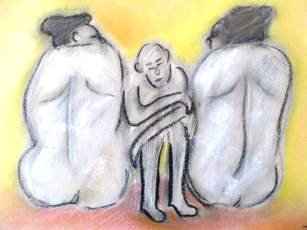Adopt A Shameless Lion !
I am so happy with the response to this lion adoption/writing circle project. There are now 48 of us!!
Please remember to link to the separate blog dedicated to the circle when you post your lions in your sidebars, so everyone can benefit from the networking. See excellent examples of lions in sidebars at Chick With A Quill, Doors Left Open, Skint Writer and A Wanderer in Paris, among others. Everyone will benefit from the linking up that this circle will offer, but bread trails have to be left. Posting your lion in the sidebar will also make him more visible, and he won't drop away buried among regular posts. The poems/prose are excellent so far ... don't forget there's a 48 word limit though. A roar a day keeps the writer's block at bay! Keep reading below for details on how you can adopt a lion and join the circle. I am keeping this post at the top of my blog for the timebeing, so sorry that normal posts are on hold for a bit.
This is an exciting opportunity, which aims to bring a lion's prestige and pride to some lucky creative writing and books blogs!
The stars of my "Lions of Lyon" series are looking for permanent homes in the blogosphere, with the aim of creating an exciting new writing circle. These lions are wanting to work their magic in your writing, on your blogs, to bring you good luck.
The 48 lions in my series are lining up to be attributed to various writing blogs, to create The Shameless Lions Writing Circle. Places are limited, so you need to be in quick. Participating blogs must have creative writing/fiction/poetry/literature as one of their main focal points. Avid readers/books blogs are also welcome.
The adoption of a lion will require you to feature its photograph in the sidebar of your blog, accompanied by your own original poem or piece of prose (no more than 48 words) inspired by the lion. You will be encouraged to use a title or caption that says: "A member of The Shameless Lions Writing Circle ". You will also be encouraged to provide a link to A BLOG DEDICATED TO THE PROJECT. The newly created site will contain the photographs of all the adopted lions, the accompanying poems/pieces of prose, as well as the details and links of the members. See my sidebar on the right for an example of how your lion can be featured.
Your very own lion will be like your mascot, representing the power and strength you need in your writing. The other lions will be there to "roar" for you and provide strength in numbers. You will be free to find a name for your lion; it might be something close to your own blogging name or something else entirely. Once all the lions are settled into their new homes a contest will be organised to choose the top five lions in terms of their design and the best accompanying poem or piece of prose. It will also be more interesting for the contest to have a real person behind each lion.
Please check out the list of Shameless Lions HERE and choose which one you would like to adopt. Lions already attributed will have "adopted" shown beside the number. Try to choose a lion that suits you, that you would be proud to have on your blog. You will need to get your choice in quickly as it will be a case of first in, first served.
So, what are you waiting for? Become part of The Shameless Lions Writing Circle, which can only bring positive things your way. Tap into the power of the king of the jungle! Spread the word on your own blogs about this possibility to adopt a shameless lion!
Please indicate your choice of lion here in the comments section or email me at: seak@caramail.com
Once I have said OK to your choice you will be able to download the photo from HERE (the enlarged version of the photo needs to be saved to your computer).
Don't be shy, let a lion roar about your writing!



















































